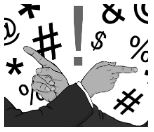In the midst of a time of European economic turmoil, Syrian civil war and the resulting waves of refugees, “free speech” is probably not the first crisis that comes to mind. Nonetheless, it is undeniable that free speech is coming under threat more and more. However, this threat to free speech does not appear to be coming from the same sources as the past in the form of oppressive governments and the like, but rather from those who claim to censor others in the name of protecting those who are discriminated against. Some have come to call this “progressive censorship.”
“Progressive censorship” essentially occurs when people deem something to be offensive or discriminating, and to protect those particular individuals who come under threat, these offensive texts are censored. This has become a particular problem in the United States, especially at universities, where students have courses changed or professors fired because they might have said something which they felt offended them. On top of that, there has been a massive increase in the importance of political correctness in the daily lives of people, where people are constantly scrutinized, either for not using more delicate terminology or for not being avid protectors of those prone to discrimination.
The crucial problem with censorship is defining what is acceptable and what is not, the act of drawing a line. This constantly changes, and is never the same between two groups of people. Different cultures, life experiences, and so many more factors will for sure change where each person or group draws this line. You are therefore stuck in this perpetual and endless war to define what should be protected under free speech, and what should be censored because it is offensive. A possibility that people have largely brushed past for whatever reason is this: why not just abolish the line altogether?
Drawing a distinction between the acceptable and the non-acceptable is too complicated to be enforced practically. There will always be disagreements regarding what should be censored, so accepting that everything can be written, or acted out, solves this problem. Of course, this does not mean that a text glorifying the holocaust will suddenly be considered acceptable. The people writing the text will still be under enormous scrutiny (as they should). But by having a text like that published as its writer intended, it opens up the possibility of a dialogue. That is after all what free speech is for. Besides (as obvious as this is, it appears people need to be reminded of this sometimes), not everyone who makes an offensive joke actually believes what they are saying!
Not allowing free speech, no matter how offensive the contents may be, is denying yourself the opportunity to actually discuss and tear apart awful reasoning. That is what some of these movements don’t seem to understand. One such example is the case of UN Women, where Zoe Quinn and Anita Sarkesian spoke out against online harassment. Obviously I don’t disagree with the fact that online harassment of women is as common as it is ridiculous. However, in this particular case what the two were asking for was the censorship of all those they deemed were harassing them. This sadly includes the people who criticize their beliefs, many of whom are also quite right in their criticisms. Aside from the fact that asking the UN to ban critics and harassers is one of the most grand examples of a first world problem (maybe the UN is better off trying to help women in countries where stoning is still in practice), it does prove the point of free speech: to create dialogues. Maybe not being so open to dialogues is an indication that your beliefs are not so convincing. Usually, when someone does not want a dialogue to happen, this seems to be the case (see: any dictatorship that has ever used any form of censorship).
I just find it both sad and hypocritical that the people who would have once been censored because the standards of the time would consider their own movements offensive are now working so hard to limit free speech. It is as though they have forgotten how important it was for these movements to be allowed to express their opinions which were very controversial at the time. Of course, the immediate response to that line of reasoning is always: “But what they defined as offensive at the time was wrong, we are a progressive movement that believes in equality and our grounds for calling for censorship are right.” While this really boils down to a much deeper philosophical debate about our understanding of right and wrong, it is not a stretch to point out that we of course think that our values are truly correct, and that it is rather naïve to think that our beliefs are timeless.
What’s more is that “art” becomes a victim if these censorship sprees as well. Movies, books, etc. are all supposed to be above the issues of political correctness. It seems as though people are tackling the problem the wrong way. Instead of treating the cancer, people are trying to hide the symptoms whenever they appear. Racism, sexism, and just being a dick in general aren’t issues that will be solved by silencing the outlets used to express these beliefs.
Nick Papaconstantinou


